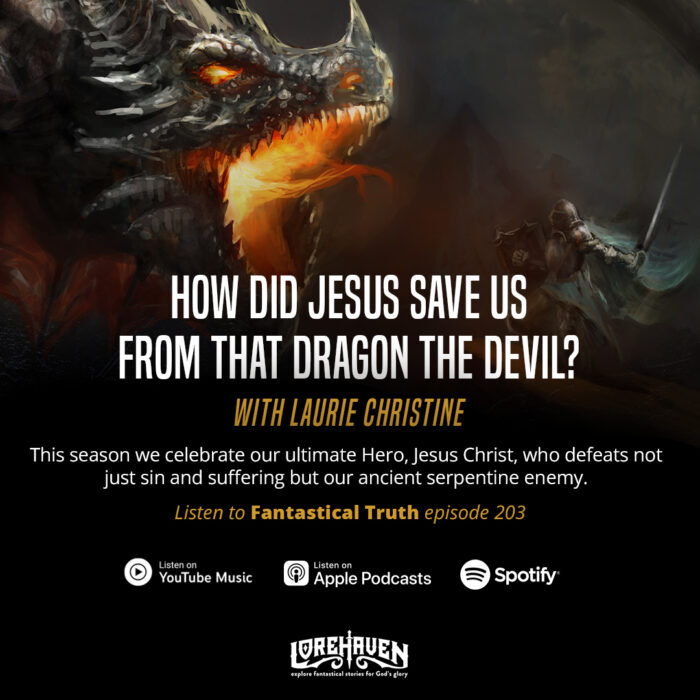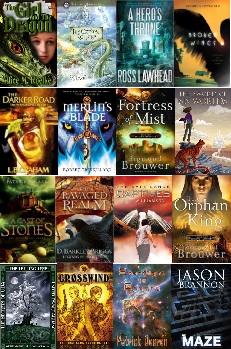Lars Walker Critiques ‘The Christian Fantasy’
Since its publication on March 20 I’ve seen this article everywhere. Maybe you have too. If you haven’t, here it is: The Christian Fantasy by fantasy novelist Lars Walker.
There’s a second reason why fantasy gets no respect. We (here I’m speaking as a fantasy writer) have earned it. I’ll make a confession here. I don’t read much fantasy, and I read almost no Christian fantasy. I’ve been burned too many times. You buy a book, hoping to experience over again the joys great fantasy can provide (for me, the Mines of Moria, the Ride of the Rohirrim, and the resurrection of Aslan provided the greatest moments of joy I’ve ever experienced in literature), and what do you get? Wannabees. Wannabee Tolkiens, wannabee Lewises, wannabee (christened) George R. R. Martins.
This springs (I think) from a basic misconception about fantasy—one that shows how few Tolkien and Lewis fans have learned anything from their role models.
The misconception goes like this—“Fantasy is just made-up stuff. It’s like dreams. Whatever you fantasize is good enough.”
No, no, no, no.
Many Speculative Faith readers would say: Yes, yes, yes, yes. Preach it.
However, Walker has many friends at this particular pulpit, a fact he admitted elsewhere:
This [attention for the column] surprises me, because I was actually a little embarrassed to submit it. I thought the material was fairly self-evident and had already been done by others. Which goes to show, you never know.
With him, let’s explore further.
- Why might some authors want to imitate Lewis and Tolkien? 1
- Should authors even be trying to equal those Inklings in aspirations and scholarship?
- What does motivate many fantasy authors to try picking up keyboard and map-drawing software?
- For what reasons is some Christian fantasy subpar (just as much secular fantasy is equally bad or worse)?
- What is the Biblical purpose of story at all? How would Lewis and Tolkien have answered that question — and how might many modern authors and readers answer it? 2
Or is Christian fantasy really subpar at all? After all, Walker admits:
I don’t know the field as well as I should.
Might he think differently after sampling some of the reader-acclaimed titles available from many indie publishers and listed in the Speculative Faith Library?
Either way, this gives all the more reason to promote a certain conference 3, and to promote other efforts to make this market grow beyond internet splinter groups, niche-marketing 4, and (I dare to suggest this) evangelical-fiction fault-finding.
- Read more at ‘The Next C.S. Lewis’? feature by Rebecca LuElla Miller, and the two-part Beyond Inklings Imitations feature series by A.T. Ross. ↩
- Here’s how I would answer that question: Beauty and Truth 4: The Chief End of Story. ↩
- Realm Makers 2013: An Expanding Vision, Rebecca P. Minor, March 22, 2013. ↩
- Content to Be a Niche, Rebecca LuElla Miller, June 11, 2012. ↩





































I don’t think this is unique to Christian Fantasy. Every genre has its wannabes. I doubt it’s a conscious attempt to imitate, although on the part of some younger writers it might be. I think mostly, though, it’s just that we write things similar to what we read. Or to the kinds of movies and TV shows we watch.
Although writers need to discover their own voices and not try to imitate Tolkein’s or Lewis’s style of writing, there’s no reason why one shouldn’t strive for an equal level of writing quality and scholarship. Or as near to it as mere mortals can get. 😉
I like Lars Walker. I had the delight of meeting him several years back at a conference, with a few other helpless nerds who bailed on a “normal evening” to have dinner with a Lutheran librarian who was honest about his publishing successes and failures. He has several valid points in his article, with which I generally agree. (Oh, who am I kidding? I’d say it myself if I were that articulate…)
Any speculative fiction writer who says “I’m going to be the next Tolkein/Lewis/etc.” operates off the same wrong assumption. That the author in question should be copied. I love me some Inklings, but I don’t want to be them. There’s this wonderful rumor that God made me special, and He loves me very much. If God made me unique, and if God was serious when He said “Be imitators of Christ”, WHY would I waste my time trying to be someone else through my writing? What is it I imitate? The fame and literary legacy? Christ calls me to pursue heavenly rewards, so at least some anonymity should be sought. The scholarship? I’m not an Oxford instructor with thirty years’ experience in writing, grading, and teaching. The writing style? But God gave me a voice of my own, and says “Speak to Me.” The more I try to be someone through my writing, the more stilted and the less real the writing becomes. Shame on me, for cheapening God’s blessing of creativity and words by emulating another person.
That’s not to say we aren’t profoundly impacted by the things we read. But how and why we read them alter how they are stored within us and how they are used in our lives and our writing. And that isn’t to say that I think myself above Tolkein or refuse to write anything like his work. Imitation is a form of flattery. I’m not a big fan of flattery.
Many wannabe writers are in pursuit of publication, not literary excellence. I think this makes a profound impact on the humility of the writers. In pursuit of excellence, a high amount of buffeting is expected. Pruning, reshaping, ruthlessly tossing the parts that do not conform to that high standard we wish to embody. If, as a writer, you wish to write like your favorite authors, you have to learn to think about writing differently. It’s not just about how thrilled a passage makes you. Reacting to the written word isn’t the same as applying critical thinking skills. And comprehending–and even communicating–what you read isn’t the same as writing that comprehension out. And expressing your comprehension isn’t the same as building your own original work, developing the world within that story, and communicating that to the reader well enough that the reader mentally inhibits the same imaginary world that you do. These are all massive steps, that take a lot of work and thought and a willingness to change. This kind of work won’t get you published, either. Publication has a great deal to do with being able to package, market, and sell an idea.
But if you want to be the “next Lewis,” you’re seeking to please your own tickled ears. Be the next Burnett (or the next Miller, or the next __________). More than any other subgenre, spec fic fans and wannabe writers look back. Every other genre is encouraged to study the market, know what works and what doesn’t, and to write in anticipation of how interests might shift in the next year. Spec fic lovers, on the other hand, don’t talk about the next big thing. They talk about the big thing they love. Don’t look behind. Don’t even look around. Faith looks up! Lift your face to the King, and see if won’t flood you with newness. Not same old, same old.
Ha ha! If anyone wants to be “the next Burnett,” please at least wait your turn behind this Burnett who’s trying to be The Next Burnett®.
Nobody will ever imitate Lewis or Tolkien because our culture is incapable of producing those kinds of men. We lack the vocabulary, the depth of study, the attention span. We wouldn’t publish their books today, or read them if they were. It’s only because they’re “classics” that we know about them at all. (And they’ve been turned into blockbuster movies.)
But we can write books at our level for our culture of today. We’ve become like that one verse about the nation that is thirsting for the word of the Lord. The world is starving for it! It’s why people devour novels and fantasy the way they do–they’re groping for that elusive something and they don’t know what it is.
I recently read an interview with Stephanie Meyer about Twilight, asking if she was anti-abortion and promoted (that hated, despised word) abstinence. She evaded both questions and talked about how she’s seen friends lose babies and so she was writing that–and she thinks that it’s more romantic for the guy and the girl to wait until marriage.
The article’s writer went on to talk about the “troubling trend” of girls who want to read books about “couples who abstain”.
Gee, you think?
I think there are a lot of writers, published or otherwise, who do in fact imitate Tolkein and Lewis. Do they do it well? Nyeh. Oh, look, it’s another story about immortal elves and/or sentient animals. A vividly imagined world is easier to borrow than to create from scratch, so a lot of fantasy writers don’t create a world substantially different from one they’ve already read in a book.
The discipline required to become that level of scholar isn’t outside of any generation’s reach, but most readers and writers keep trying to skip to the end. Given the option of climbing a great mountain or being deposited by helicopter, most humans skip the long journey and rely on the genius of others. They like the view, but then don’t have the sense of personal accomplishment that the climb would have afforded. This philosophy works well enough in science, but in fiction it produces fewer lasting monuments. If that’s the culture we’re writing for, and we’re writing in it and of it, then we shouldn’t be surprised at the flash-in-the-pan nature of the fiction we produce. Which has its place, certainly.
[Sidebar with a purpose] The majority of choral performances and modes of study today are what is called a Robert Shaw choir. Some of the inviolate theory tenets include (1) no vibrato (tremors in the vocal cords that stop and start a note very fast), (2) no missed notes (each voice strives for perfect pitch, requiring exact Hz), and (3) no overtones (see below). These are notable because they are polar opposite to a Westminster choir training, which demands vibrato and overtones and consequently expects missed notes. What’s overtone? When creating that note, a singer must thrum those vocal cords to sing. But every singer has the option of opening their esophagus and larynx in both directions, pressing the diaphragm down to create a bigger space inside the body. Each human body has a slightly different shape and frequency, which sets up a musician with an open inner space to have “hidden” notes materialize along with the intended sound. (If you play a high C on a piano while silently depressing the low C octave and middle register C chord, the piano will reverberate with all these extra notes that you aren’t playing. You’ve just set up the instrument to surprise you.) Now, in a Robert Shaw choir, each voice must thrum those vocal cords to make the exact same sound, with no extra opening of the body. In a Westminster choir, however, each musician must create the maximum open space inside and then thrum those cords. Because each person is unique, the sounds come out different for each singer, but the overtones they all create allows the differences to blend in surprising harmony. (If choir members are mixed, the Westminster students stand out but still manage to blend, but the Robert Shaw students can’t keep up.)
Lewis, Tolkein, and a handful of other spec fic “giants” should be considered Westminster choir members here. Their work strikes chords in us because they’ve tapped into some deep currents at work in the human spirit. Most writers more popular fiction than literary fiction. Robert Shaws. This isn’t wrong, but it is unfair to expect something written for the moment to last. Books like Gone with the Wind or Lord of the Rings are particularly powerful and lasting because the writers are looking back on something precious that they lost. Never mind the plot, those themes and motifs ensnare the willing victim reader. The changes war brings in any surviving generation pluck at those deep currents and make it easy for the writer to draw the reader into the need for survival.
As wannabe spec fic writers, we’re all faced with the choice of where do we want to go with our story? We can borrow a world-frame from a story we already love. At which point we should expect to be criticized for being unoriginal. We can rewrite a Bible story in a fantastic setting to make it CBA. And then we should expect to be called predictable. Going off the map into uncharted territory is scary. It’s what those two famous Inklings wound up doing. But they “opened down” to create all those overtones, using their education, their life’s work, their experience as young men, looking at those times through wiser old eyes. The Westminster note you hit won’t sound like the one I hit. But since we’re singing the same note, the harmony will communicate more of God’s wonder. Not less.
Here’s the article, if anybody’s interested!
http://www.guardian.co.uk/books/2013/mar/11/stephenie-meyer-twilight-the-host
While I totally get your cynicism, Kessie (I, too, see little of value in contemporary American culture), I heft one of the massive tomes of Brandon Sanderson, Patrick Rothfuss, or Tad Williams and am compelled to disagree. Those immensely popular authors write multi-thousand-page narratives of technical beauty and thematic complexity. Their worlds require a not-insignificant breadth of vocabulary, depth of study, and length of attention-span to consume, let alone create. They’re not Tolkiens or Lewises, sure, because they’re not the first to do what they do. But even I, a guy who’s read The Lord of the Rings nine times through, had to admit that Sanderson’s Way of Kings was, as a novel, just as good or better than Tolkien’s opus (gasp! sacrilege!). And although Perelandra blew my mind in a way it’s rarely been blown either before or since, it was not without its (minor) flaws of storytelling. We do ourselves a disservice when we erect pedestals upon which to ensconce our favorite authors. Though this is difficult for me to admit — even now that so many years have passed since I first wept as Sam returned from the Havens — Tolkien didn’t write the perfect novel. There’s no such thing this side of glory. What Tolkien did, among many many things, was to tap a depthless well of wonder and awe and draw a rivulet up into the light so the rest of us could ease a little of our thirst. The well still beckons, irrespective of one man’s now-widely-accepted approach. And we the people have yet to be quenched.
My first foray into long-form fiction featured a dwarf-colony in the Grey Mountains of Middle-Earth. It was kind of a cross between The Hobbit and The Bourne Identity. It was fun to write, for a time, and I still like some of its scenes. But eventually the fact that I was inhabiting another man’s creation began to gnaw at me. I felt I needed to start drinking from my own cistern, as it were. Of course none of us can create anything ex nihilo; we are all of us derivative of the ultimate Creator. But what could I call what I’d written? “Tertiary creation”? I was a child attempting to imitate a merely human father, and poorly at that. When I raised my eyes to the works of the Father Whose imagination is incapable of exhaustion, the scope of my own writing abruptly dilated to the horizon.
My analogy here is simple: the deliberate imitation of human writers is an unnecessary constraint. We must study our literary forebears and learn from their genius, yes. But turning them into idols will only hobble our own potential. God Almighty is the same yesterday, today, and forever, and the imitation of His genius will always lead to excellence.